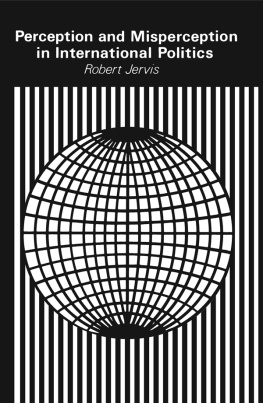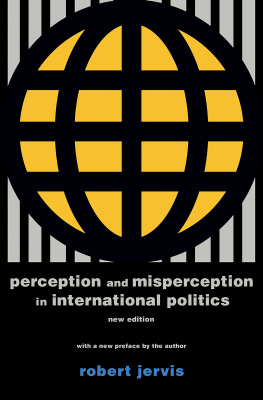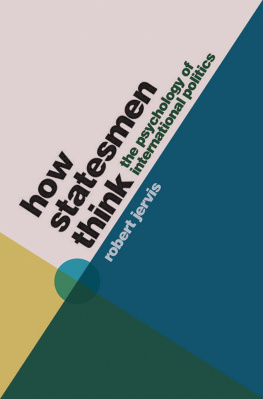Jervis - Perception and Misperception in International Politics
Here you can read online Jervis - Perception and Misperception in International Politics full text of the book (entire story) in english for free. Download pdf and epub, get meaning, cover and reviews about this ebook. City: Princeton, year: 1976;2015, publisher: Princeton University Press, genre: Politics. Description of the work, (preface) as well as reviews are available. Best literature library LitArk.com created for fans of good reading and offers a wide selection of genres:
Romance novel
Science fiction
Adventure
Detective
Science
History
Home and family
Prose
Art
Politics
Computer
Non-fiction
Religion
Business
Children
Humor
Choose a favorite category and find really read worthwhile books. Enjoy immersion in the world of imagination, feel the emotions of the characters or learn something new for yourself, make an fascinating discovery.
Perception and Misperception in International Politics: summary, description and annotation
We offer to read an annotation, description, summary or preface (depends on what the author of the book "Perception and Misperception in International Politics" wrote himself). If you haven't found the necessary information about the book — write in the comments, we will try to find it.
Jervis: author's other books
Who wrote Perception and Misperception in International Politics? Find out the surname, the name of the author of the book and a list of all author's works by series.
Perception and Misperception in International Politics — read online for free the complete book (whole text) full work
Below is the text of the book, divided by pages. System saving the place of the last page read, allows you to conveniently read the book "Perception and Misperception in International Politics" online for free, without having to search again every time where you left off. Put a bookmark, and you can go to the page where you finished reading at any time.
Font size:
Interval:
Bookmark:

Perception and Misperception in International Politics
Written under the auspices of the Center for International Affairs, Harvard University
Robert Jervis
Perception and Misperception in International Politics
PRINCETON UNIVERSITY PRESS
Princeton, New Jersey
Copyright 1976 by Princeton University Press
Published by Princeton University Press, Princeton, New Jersey
In the United Kingdom: Princeton University Press, Chichester, West Sussex
ALL RIGHTS RESERVED
L IBRARY OF C ONGRESS C ATALOGING-IN- P UBUCATION D ATA
Jervis, Robert, 1940
Perception and misperception in international politics.
Bibliography: p.
Includes index.
1. International relationsResearch. I. Title.
JX1291.J47 327.019 76-3259
ISBN 0-691-05656-0
ISBN 0-691-10049-7 (pbk.)
This book has been composed in Linotype Times Roman
Princeton University Press books are printed on acid-free paper and meet the guidelines for permanence and durability of the Committee on Production Guidelines for Book Longevity of the Council on Library Resources
http://pup.princeton.edu
Printed in the United States of America
16 18 20 19 17
ISBN-13: 978-0-691-10049-4 (pbk.)
ISBN-10: 0-691-10049-7 (pbk.)
To Kathe
ACKNOWLEDGMENTS
I AM grateful to many friends and colleagues for assistance. Chapters of this book were commented on by Hayward Alker, Matthew Bonham, Robert Bowie, William Caspary, Paul Diesing, Harold Kelley, James Kurth, Charles Lockhart, Andrew Marshall, Ernest May, Richard Merritt, Charles Osgood, Dean Pruitt, James Richardson, and Fred Sondermann. Others with greater stamina have read and offered suggestions on the entire book: Robert Abelson, Alexander George, Ole Holsti, John Montgomery, Glenn Snyder, and Kenneth Waltz. Steven Isoardi and Glen Stassen were excellent research assistants and Gail Filion of Princeton University Press made the book more readable. Joan Krasner labored over the index without ever resorting to categories like International incidents, obscure.
Generous financial support was given by the Harvard Center for International Affairs, the Council on Foreign Relations, the Social Science Research Council, and the UCLA Research Committee. Cathy Brest, Barbara Brennecke, and Nancy Kaplan typed the disorderly manuscript more times than they like to remember.
R.J.
Los Angeles
August 1975
Perception and Misperception in International Politics
INTRODUCTION
W HAT are the causes and consequences of misperception? What kinds of perceptual errors commonly occur in decision-making? How are beliefs about politics and images of other actors formed and altered? How do decision-makers draw inferences from information, especially information that could be seen as contradicting their own views?
These questions have not been adequately discussed by specialists in either psychology or international relations. The latter have assumed that decision-makers usually perceive the world quite accurately and that those misperceptions that do occur can only be treated as random accidents. This book seeks to demonstrate that this view is incorrect. Perceptions of the world and of other actors diverge from reality in patterns that we can detect and for reasons that we can understand. We can find both misperceptions that are common to diverse kinds of people and important differences in perceptions that can be explained without delving too deeply into individuals psyches. This knowledge can be used not only to explain specific decisions but also to account for patterns of interaction and to improve our general understanding of international relations.
If scholars trained in international relations have paid little attention to perceptions, the same cannot be said for psychologists.
Second, almost all the data supporting the theories are derived from laboratory experiments. Whether these settings and the manipulations that are employed reveal processes that are at work in the real world is hard to determine. Even harder to gauge is whether the influences discovered in the laboratory are strong enough to make themselves felt, and felt in the same way, when they are intermixed with the other powerful variables that affect political decision-making. For example, very few experiments give the subjects incentives to perceive accurately, yet this is the prime concern of decision-makers.
Third, a strong policy bias pervades most of the analysisthe element of conflict of interest is played down in international relations in general and in the Cold War in particular.
Fourth, and related to the last point, the structure of the international system and the dangers and opportunities peculiar to this setting are often overlooked or misunderstood. As a result of these four weaknesses, this literature contains a great deal of over-psychologizing; explanations, usually highly critical of the decision-maker, involving many psychological variables are given for behavior that can be explained more convincingly by political analysis. More specifically, there is little comprehension of the consequences of the lack of a sovereign in the international realm and little analysis of the reasons why even highly rational decision-makers often conclude that they must be extremely suspicious and mistrustful. These biases also lead psychologists to analyze only the views of those statesmen with whom they have little sympathy and to refrain from using their theories to treat the policy preferences of those with whom they agree. Thus images and reasoning drawn from the hard line approach to foreign policy are examined to show the operation of emotional influences and cognitive processes that inhibits intelligent decision-making, but arguments and belief systems that support conciliation are never analyzed in these terms.
As grave as these defects are, they are less troubling and less hard to rectify than the fifth: most psychological theories, and especially those that have been applied to international relations, do not account for the ways that highly intelligent people think about problems that are crucial to them. And few of the experiments that provide the bulk of the empirical evidence for the theories have been directed to this question. Rather, theories about the formation and change of beliefs have been constructed around beliefs that are relatively unimportant to the person, about which he has little information, and for which the consequences of being right or wrong are only minor. One reason for this is that the desire to construct theories that are rigorous and parsimonious has meant that only simple beliefs can be analyzed. Although this may be the best way to produce theories that eventually will be able to explain complex thinking, there is little reason to expect that at their present stage of development such theories will provide much assistance in understanding the ways Similarly, Peter Sperlich argues that consistency theories, which are the type most commonly used by psychologists studying international relations,
probably can provide rather adequate explanations for behaviors of the very young, of the retarded, and of some of the ill. They are also likely to give adequate explanations for behaviors of normal adults in certain circumstances, e.g., when frightened, when in completely unfamiliar environment other than by choice, when deprived of material sustenance for some length of time, or when strong emotions have attained temporary dominance over the person. What these constructs do not seem to be able to furnish are reliable and valid accounts of complex adult behavior in non-crisis situations.
Next pageFont size:
Interval:
Bookmark:
Similar books «Perception and Misperception in International Politics»
Look at similar books to Perception and Misperception in International Politics. We have selected literature similar in name and meaning in the hope of providing readers with more options to find new, interesting, not yet read works.
Discussion, reviews of the book Perception and Misperception in International Politics and just readers' own opinions. Leave your comments, write what you think about the work, its meaning or the main characters. Specify what exactly you liked and what you didn't like, and why you think so.










